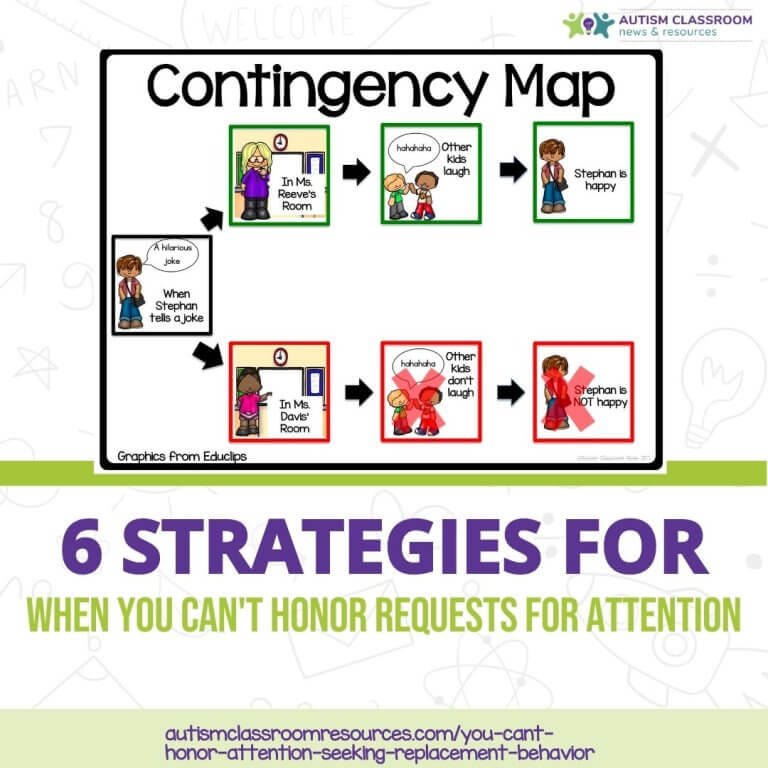Ever met a kid on the spectrum who only wants to talk about Toy Story? Ever met one who can only talk about the circus? Or fans? Or an event that happened three weeks ago? Typically, this is a student who is perseverating or getting stuck on a topic. Unfortunately, this student being stuck is driving and/or your other kids crazy. You get to the point where if you hear about The Incredibles or the circus one more time, you might scream. You just want it to stop. The first step in doing that is trying to figure out why it is happening. Just like any problematic behavior, the perseveration has a function. There are three common reasons why someone perseverates on a topic. Keep in mind that they are common functions and may or may not apply to your student–you will need to analyze your student’s behavior to determine the actual function. However, they are a good place to start.
Possible Functions of Perseverations
1. Gaining attention.
Imagine that you were on a very remote island off Italy and didn’t speak the language. You had been there for a month and not been able to talk to anyone. You might really want to engage someone in conversation when you discover that they start talking to you when you talk about dinner. So you find, over time, that you are frequently asking, “What’s for dinner?” Once the person answers you don’t have enough Italian to talk about the dinner choices so you just listen. After a while you might repeat the one phrase you can say, “What’s for dinner?” to get them to talk to you again.
If you are a student with limited communication and social skills, this scenario might be a good portion of your daily life. You may only have one topic you can talk about and it may reliably get people to interact with you. This is especially true if the perseveration topic is repeating something from a movie or video game.
2. Talking About the Topic is Reinforcing
Sometimes you just want to talk about something you really like. You read teaching blogs? You chat on Facebook with teacher friends? Maybe you like teaching? You saw an amazing movie last night? Don’t you just really want to tell someone about it? Now imagine that you tell your significant other and he or she is clearly not interested. What do you do? I would call my sister or a friend and tell them about it. What if I didn’t have the social problem solving skills to recognize that my significant other isn’t interested or that I could contact someone else and continue to talk about it? I might get stuck on talking to you about even though you are showing me every sign that you are not interested because I really enjoy talking about it. We do this with hobbies and interests all the time. The difference is we know when to shift listeners but often our students don’t.
3. Easing Anxiety (Automatic Reinforcement)
Imagine that you recently went to the doctor and she ran some tests to see if the headaches you were having were something serious. She tells you she will call when she has the results. You are a teacher and have no cell phone coverage in your classroom. At 4:30 PM on Friday, when you get out of school, there is a message from the doctor on your phone. When you check it, she says to call her because she has the test results back. You call, but her office is closed for the weekend. Is it possible this might make you a little anxious? That anxiety might drive you to call your sister and talk about what the possible options for test results are or what you might do depending on what they are. Again, the difference is in assessing the listener. If I sensed that my sister was getting tired of hearing about it, but I was still anxious, I would find another listener and another until my anxiety felt better or I found a different coping mechanism. I would talk about it obsessively because I was anxious about. Anxiety is the underlying element of most obsessive behaviors so when we see them, we need to think about how we might lessen the anxiety and teach coping skills.
In my next post I will talk about some specific strategies (with a freebie) to try to reduce perseveration, but in the meantime, think about the underlying function that might be causing it. Just getting rid of it doesn’t solve the problem and you are likely to see another perseveration or another behavior pop up in its place because we haven’t solved the underlying problem. It’s like taking antibiotics for a virus…the problem might go away but it probably wasn’t the antibiotics that did it, and another problem may be caused if the virus doesn’t resolve. Generally if the problem is that the person can’t identify signs that they should stop talking to someone about a topic, we might make that more specific and give alternatives while teaching them how to look for signs that someone doesn’t want to talk about it anymore. If the problem is anxiety-related, we need to look for ways to help them reduce the anxiety. You might want to check out my post on helping students identify stressful situations and the one on managing anxiety.
Until next time,








